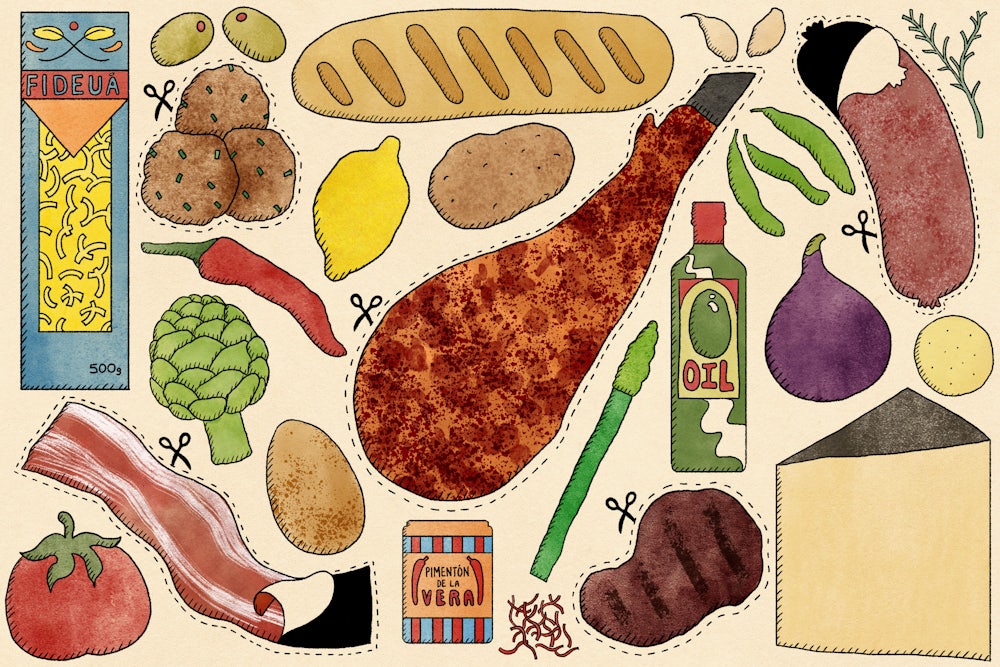In early July, Spain’s minister of consumer affairs, Alberto Garzón, posted a short video on Twitter urging Spaniards to decrease their meat consumption. From a political communication perspective, it was flawless. He listed the many ways large-scale meat production and consumption harm humans, the environment, and animals, all backed by peer-reviewed science. He focused on reducing meat intake, not eliminating it—he praised nonindustrial livestock systems and family barbecues. He acknowledged that changing diets is hard for those without access to cheap, accessible, and diverse food choices. He explained that the government would launch food education campaigns and implement regulations to incentivize more sustainable diets. He even added a hashtag: #MenosCarneMasVida (Less Meat More Life).
Spanish politics exploded. While Garzón’s nuanced, well-researched message received some support (the number of Spaniards who claim to want to reduce their meat consumption is rising), several fellow politicians turned to juvenile trolling. Prime Minister Pedro Sanchez, of Spain’s socialist party, gushed about his love of the chuletón steak to a press conference, and Teodoro García Egea of the right-wing People’s Party tweeted out a picture of a grill packed with slabs of meat with the caption, “To your health.”
The affair brilliantly displayed the fraught politics of dietary change. The average Western diet—prevalent in Spain, just as it is in the United States and the United Kingdom—is high in meat, fat, and sugar, its production and consumption an environmental and public health disaster. This has been true for decades. But in the past few years, a growing chorus of voices have begun to call for major dietary changes in the interest of human and planetary health. The EAT-Lancet report published in February 2019 called for a global shift to a primarily plant-based diet if we are to keep agricultural production within planetary limits. The problem, however, is that actually changing what people eat is extremely difficult. Who should drive this change: individuals, governments, or corporations? Can a balance be struck between consumer freedom and regulation? And how can rational policymaking be squared with food’s significant cultural, nationalist, and personal meaning?
Beef is where this kind of discussion usually starts because it’s where the scientific consensus is particularly strong. The world’s one billion cows contribute about 6 percent of all greenhouse gases through their methane-rich burps, require vast amounts of grazing land, and are often fattened for slaughter on industrial feedlots where they are fed a diet of monocrops like corn and soy, whose planting in turn contributes to widespread deforestation and pesticide use. Overconsumption of red meat has also been linked to a range of health issues.
Steaks, in other words, are the SUVs of meat: expensive, unnecessary, environmentally noxious status symbols that do far more harm than good. There’s a good case for eliminating beef consumption entirely, and drastically reducing it ought to be a no-brainer: The EAT-Lancet model diet, for instance, suggests limiting beef to 98 grams per week (and all meat to under 500 grams). That amounts to a 60 percent decrease, relative to a Spaniard’s average diet, and a massive 86 percent decrease in the USA.
The traditional way for NGOs, companies, and governments to approach dietary change is through information campaigns and so-called nudges that don’t impinge on individual choice or risk regulatory and legislative battles. They’re nonintrusive ways of suggesting more healthy or ethical choices to consumers—like releasing EAT-Lancet recommendations or national dietary guidelines, slapping “fair trade” labels on coffee or “humanely raised” labels on meat. It can also mean deciding not to promote a product, as the food website Epicurious did when it vowed to stop running beef recipes for many of the reasons mentioned by Garzón.
The problem with these interventions is that they are not all that effective. While consumers may claim they want to make more informed or sustainable decisions, they tend to default to their usual habits in the supermarket aisles. And information doesn’t necessarily shift behavior; it may even have the opposite effect. Psychologists argue that when consumers face the “meat paradox” of eating meat while being opposed to the harms caused by it, they will often create justificatory narratives and rationalizations that deny harm or personal responsibility rather than actually halting meat consumption.
These mild, less effective policy efforts also tend to be attacked by critics as if they were actually reducing consumer choice. EAT-Lancet was met with a coordinated online countercampaign under the hashtag #yes2meat. Epicurious was lambasted by pro-beef critics, including foodies and food writers, in the wake of its decision. When the United Nations tried to call for meat reduction to mitigate climate change, it too was brutally critiqued, including by pro-meat climate scholars.
Changing the scope and availability of choices in any given situation may be more productive. This is called changing “choice architecture,” and there’s good evidence for its efficacy. For instance, removing beef jerky from among the impulse-buy items in a checkout line disincentivizes jerky purchases just by moving them out of sight and out of mind. Major opportunities for choice-architecture manipulation exist in supermarkets and restaurants, which could commit to selling less beef, promoting more healthful options, or replacing meat with alternative proteins, as a growing number of fast-food joints are doing.
These changes can have an even bigger impact in institutional spaces like schools that have large provisioning budgets and feed large numbers of people; such changes can shift both individuals’ habits and influence the economics of food distribution. Studies have shown that simply increasing the number of vegetarian options or making plant-based meals the default instead of meat massively increases more sustainable eating. And shifting food patterns in schools can build the next generation of more sustainable eaters.
But there’s stiff opposition here, too. When schools in Lyon, France, moved to make lunches plant-forward (albeit with fish and egg and dairy options available), farmers stormed the city in protest and the French minister of agriculture clamored against anti-meat “ideology.” In the U.S., Joni Ernst, the infamously meat-industry-friendly senator from Iowa whose campaign advertising included boasts about pig castration, has introduced an act to preemptively preclude federal institutions from engaging in nudges like “Meatless Monday.”
That brings us to state intervention. Government has tremendous power to address collective action problems through incentives, regulations, and taxation. In the world of public health, these interventions are ranked on a scale called the Nuffield Ladder, with gentle nudges at the bottom and outright bans at the top. One of the most commonly used tools is taxation. In particular, governments can implement what are known as Pigouvian taxes on things like sugary drinks, tobacco, or polluting factories—the idea is to force producers to cover the cost of the harms their products do. They can also slap so-called “sin taxes” on products to increase direct costs for consumers. These taxes work. Numerous studies show that these are very effective in decreasing consumption, leading groups like the World Health Organization to strongly support them. The academic case for such taxes on meat is robust and convincing. But taxes in general are massively politically unpopular and lead to accusations of a nanny state interfering in consumers’ free choice, as the battles over sugar taxes around the world have shown.
On July 15, the U.K. released its Food Strategy, a well-researched document urging a reshaping of the British food system in the interest of health and sustainability. It called for reductions in sugar, salt, and meat. But the authors only suggested a tax on sugar and salt, shying away from a “politically impossible” meat tax. Instead, they recommended plant-forward dietary nudges and subsidies for the development of alternative proteins.
It’s a good illustration of the way policymakers often self-edit when it comes to such a fraught topic. The problem is that, while this approach is politically pragmatic, it is naïve to expect that clinging to the lower rungs of the Nuffield Ladder can lead to even the Food Strategy’s suggested 30 percent reduction in meat consumption, let alone the EAT-Lancet standard.
But the problem isn’t only that policymakers are wary of inviting pro-meat backlash. It’s also that virtually all governments subsidize and promote meat production and consumption. The EU, despite its Green Deal commitment to carbon neutrality by 2050, has spent millions of Euros on a “Beefatarian” advertising campaign, and both Europe and the USA support animal agriculture through extensive subsidies and supports. Changing this dynamic—a status quo in which politicians pick up points by slamming vegetarians while support for the meat industry is baked into countless national budgets—will require a multifaceted approach.
Incentivizing the production of alternatives in addition to, or ideally instead of, harmful products like beef, as the U.K. Food Strategy does with its support for alternative proteins, is one good option. But such support should include not only plant-based or cell-based “meat alternatives” but also plants as alternatives to meat. A recent study published in Global Food Security, for instance, shows that humble legumes, with the right government push, could provide a far more sustainable and diverse source of protein than meat. Creating opportunities for food access is also crucial, including quite simply pushing for higher incomes, through policies like minimum wage laws to allow consumers a greater range of options and creating more robust nutritional assistance programs. An EAT-Lancet-compliant diet, for instance, is readily within financial reach for most people in the global north but far too expensive for over a billion people worldwide.
Usually when collective-action problems are discussed, a crude dichotomy emerges between individual action and policy. Many commentators suggest that individual action is effectively meaningless and collective action is where all political efforts should be directed. (After all, what does it matter if I eat a burger or chuletón now and then, when what matters is challenging the meat industry and the political-economic structures that enable it?) But with food—intensely personal, with individuals voting with their forks multiple times per day—individual change is worth revisiting. It may matter little in the aggregate if any one individual changes their diet, much as it matters little in the greater scheme of things if they drive an SUV or vote in elections. But changes to individual actions taken together can play two important roles. The first is norm change.
Extensive research shows that humans, by virtue of being social animals, are influenced both by others’ action and by a desire for sociability itself. An influential article in the journal Science on the topic specifically uses diet as an example, arguing that “if a less meat-intensive diet became the norm, individuals might conform partly owing to social pressure or a wish to be environmentally friendly; but a primary motive may simply be to enjoy pleasant and convenient joint meals.”
Changes in norms and demand, in turn, can send market signals to retailers and producers about what sorts of products consumers want, which in turn can reinforce norms. For instance, demand for beef-like burgers like the Beyond Burger tells retailers and restaurants that they should stock the burger, which they then promote, inadvertently creating a nudge for other consumers to try it. Changing norms also change people’s values, and people who change their individual behavior in line with their values on climate issues are more likely to support climate policies. Policy, in turn, can support such norm change, but that means telling people that their individual actions actually matter.
Ultimately, it’s not clear that all consumers value their consumer freedom as much as politicians claim they do. Surveys suggest that people expect governments to ensure healthy and sustainable diets. And while much of the meat culture war focuses on alleged government overreach and consumer freedom, research shows that the public, even if initially skeptical, tends to favor policies that restrict individual consumer freedom once the benefits become visible. This is the case for everything from urban congestion taxes to bans on smoking in bars and even sugary drink taxes.
What does all of this mean for dietary change? The trite answer is that there is no silver bullet solution and that we need an “all of the above” approach that includes individual and collective action and policy shifts. We also need to accept that any shift in the status quo is going to generate pushback. Eventually the culture war over meat is going to have to be fought. The politicians brave enough to fight it might just find that the public cares more about environmental and public health—and maybe even animal rights—than their right to meat. But one thing is clear: Backing down from proposing policies like a meat tax because of potential political fights is a losing strategy. It’s important to be clear-eyed about the fact that there is no single policy or set of policies that will work for all people and in all places, and some conflicts—be they between proponents of back-to-the-land agro-ecology and futurist boosters of alternative proteins, or between cattle ranchers and the politicians who oppose beef— will not be amicably resolved. That’s the stuff of politics.
But individual action can also be political. Individual changes in diet, while minuscule in their immediate impact, can play an important role in shifting norms. Even if not everyone can do so, those who can make more sustainable choices should. After all, how can we expect a public that’s unwilling to make any individual changes to their diet to support policies that would restrict their diets? It all matters. Change, as the environmentalists of old preached, begins on your plate. But it can’t end there.




